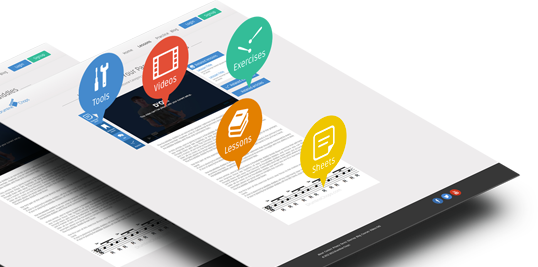I want to share an incredibly valuable story with you.
I started working with a new student the other week and in our third lesson we were working on double stroke rolls. To be more specific, we were working on the consistency of his double stroke rolls in regards to tone quality, rhythmic accuracy, and flow.
He was getting frustrated with the fact that he had practiced but wasn’t seeing results with the things we were focusing on. He wasn’t achieving the tone quality that he wanted, he wasn’t achieving the rhythmic accuracy he wanted, and he wasn’t achieving the flow that he wanted.
So I asked him, “What have you been practicing?”
His responded, “Paradiddle Pyramid and learning show excerpts from different drum corps.”
I looked at him for a moment and then asked, “Do you see what’s holding you back?”
He thought about it for a moment, paused, and replied, “No, not really.”
I asked, “What are you trying to accomplish right now? What are you trying to improve?”
He immediately answered, “The tone quality, rhythmic accuracy, and flow of my double stroke rolls.”
I said, “Good. Now tell me again what you practiced this week.”
He jumped on the answer and said, “Paradiddle Pyramid and learning show excerpts from different drum corps.”
A moment went by and then a light bulb went off in his brain, “Ooohhh...I didn’t focus on what I’m actually trying to improve.”
Ding! Ding! Ding!
You see, he was spending valuable practice time learning things that didn’t align with his personal goal of developing more consistent double stroke rolls. No wonder he wasn’t making any progress!
Don’t Set Yourself Up to Fail
This is an extremely common mistake that a lot of students make and you may be making them too.
It’s easy to say, “I wish I could play better rolls” or compare yourself to another person in your drumline by saying, “I wish I could play double stroke rolls as well as Zach does.”
But that’s usually where the thought ends and it becomes a detrimental attack on your self conscious. Over time, enough of these thoughts can completely ruin your motivation and inspiration to do anything well. You get stuck in the “I’ll never be good” mindset and give up.
Sound familiar?
Yeah, we’ve all been there...and it’s depressing.
The good news is I have a great practice tip that will completely solve this problem for you. It will help you focus on what matters in your playing and boost your practice results like crazy which will improve your self confidence and make you feel really...really good about your playing!
Use “The Rule of Three”
The Rule of Three is a really simple yet ultra-effective practice technique that is guaranteed to produce results. Here’s how it works:
Step 1) Every week, create a goal of something you need to improve with your rudimental drumming.
Step 2) Every day, write your week’s goal at the top of a piece of paper. Under the goal, list three actionable steps that will move you closer to your drumming goal. These three steps can include practicing exercises, breaking down show music, etc.
Step 3) Define the key areas that you need to focus on improving while practicing the three action steps to get you closer towards meeting your goal.
Step 4) Practice each action step and as you complete each one, cross it off the list.
Step 5) Rinse and repeat
By creating this list, you are consistently asking yourself, “What are my drumming goals for the day, the week, the month, etc.” Furthermore, you’re setting yourself up for success by defining a step by step program to achieve your goals AND taking action by working on specific exercises that will help you get there!
Seriously, this tactic is extremely simple and works like a charm.
Let’s take a look at how it would apply to the particular student in the conversation above. Remember, his goal was to develop consistency in his rolls so one day might look like this:
GOAL: Improve the tone quality, rhythmic consistency, and flow of my double stroke rolls.
1) Practice Gallop at 85 bpm and focus on the rhythmic consistency of the double strokes
2) Practice Triplet Diddle at 100 bpm and ensure the tone quality stays open throughout every passage
3) Practice Chicken and a Roll at 110 bpm and focus on the flow and consistency of longer rolls
There you have it. Three specific exercises and focus points that will help move him closer towards achieving his goal. The cumulative effect of this little practice trick can be mind-blowing. There’s no doubt that all of these action steps are completely manageable and achievable. Furthermore, writing them out and achieving them on a daily basis keeps you motivated and excited to achieve even more the following day.
Take Action and Achieve Your Rudimental Drumming Dreams
Whether your goal is to improve a certain rudiment, learn a grid, make the snare line at your school, or march a drum corps, the Rule of Three will help get you there!
Apply the Rule of Three to your practice this week and see what you’re able to achieve. I’m willing to bet you’ll be pretty shocked!
For more proven tips and effective exercises that will skyrocket your drumming, become an all-access member of Drumline Chops for just $19 a month! We offer a 30 day money back guarantee so you’ve got absolutely nothing to lose!
Sign up here and accelerate your playing faster than you ever imagined!



